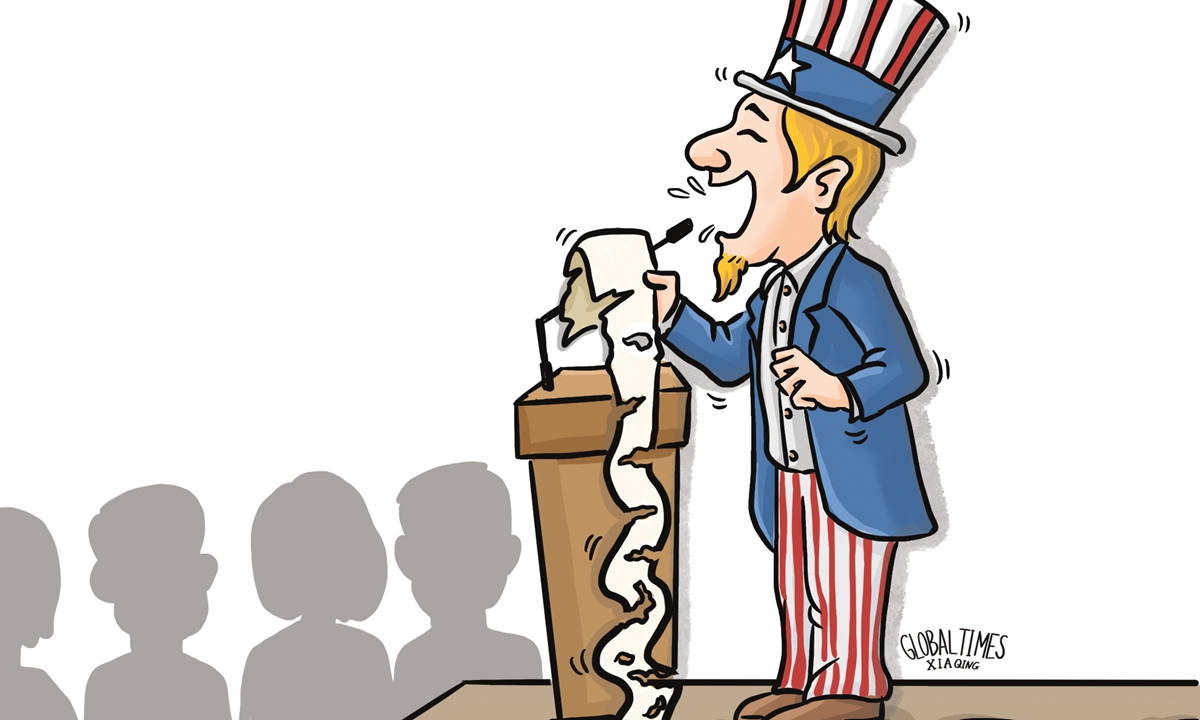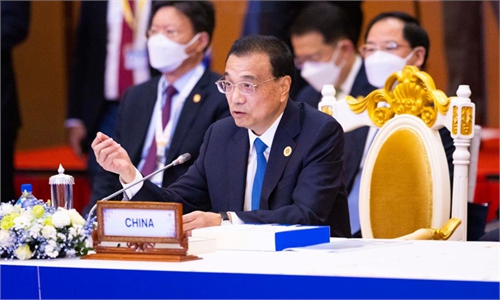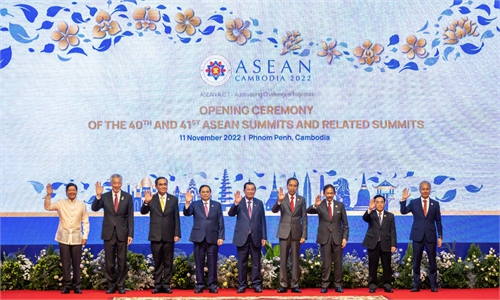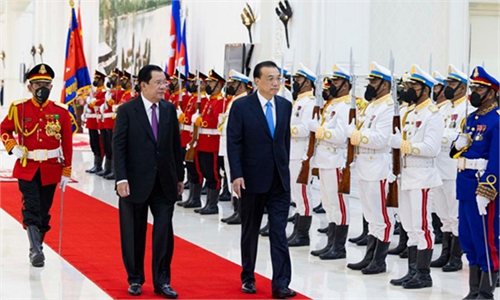
US has no feasible plan to help ASEAN 'build back better'. Illustration: Xia Qing/GT
US President Joe Biden touched down Saturday in Phnom Penh, Cambodia, and participated in the US-ASEAN Summit, during which the bilateral relations were elevated to a Comprehensive Strategic Partnership. Biden also attended the East Asia Summit on Sunday. Western media outlets did not even bother to put a filter on Biden's goal, and spelt the situation out bluntly - it is about a competition for influence with China.
Biden "intends to ask China's neighbors to stiff-arm the regional behemoth," Politico commented on Friday. Nikkei was slightly concerned, suggesting "after reopening doors in ASEAN, Biden must put something on table," on Wednesday. On Saturday, when VOA Chinese website analyzed Biden's attempt to counter Beijing's influence in the region, it acknowledged the task will be tricky.
It reminds people of the ASEAN-US Special Summit in May. At that time, the US side spared no effort in using fancy words to describe the event, saying it was "historic," the "first time" in 45 years ASEAN leaders had been welcomed together in Washington, DC. Biden himself declared the two sides "inaugurate a new era of partnership." This time, media outlets are also highlighting the significance of the trip by emphasizing Biden is the "first US leader since 2017" to attend the meetings hosted by ASEAN.
Sun Xihui, an associate research fellow with the National Institute of International Strategy at the Chinese Academy of Social Sciences (CASS), told the Global Times that for the Biden administration, upgrading the relationship with ASEAN is a way to get more domestic points in terms of diplomacy, since its governance is facing challenges from the Republican Party.
"This is a pragmatic strategy, as Washington wants to further rope ASEAN in and work together to isolate and counterbalance China," Sun noted.
To some degree, the joint statement issued on Saturday evening did show Washington's diplomatic effort and substantial will to build stronger ties with ASEAN, but again, not many solid achievements can be found, Shen Yi, a professor at Fudan University, told Global Times.
How to digest the "new era" of US-ASEAN ties, or the US-ASEAN Comprehensive Strategic Partnership, launched on Saturday? Li Kaisheng, a research fellow at the Shanghai Academy of Social Sciences, told Global Times that the most concrete manifestation is Biden's $150 million commitment to ASEAN leaders, made in May, on their cooperation, and US newly announced $860 million assistance in 2022, through the Department of State and US Agency for International Development, to ASEAN.
Ironically, "the figures are a drop in the bucket if compared to US support for Ukraine," Li said. According to Pentagon, the US has committed more than $18.9 billion in security assistance to Ukraine since the beginning of the Biden Administration.
Not to mention throughout the latest statement and fact sheet, not many more specific numbers are evident as the US tries to portray a wide range of cooperation fields with ASEAN. More maritime cooperation will be carried out, which signals the US is paving the way to drive a wedge between China and Southeast Asian nations in the future, according to observers.
The stumbling block in US-ASEAN ties is the US itself. Thanks to US swaying policies, its promises are hardly trustworthy anymore.
More importantly, the US has been dealing with ASEAN ties through the prism of the major power game with China. This has made Southeast Asian countries question US' sincerity, which, in turn, hinders the further progress of US-ASEAN relations, Zhang Tengjun, deputy director of the Department for Asia-Pacific Studies at the China Institute of International Studies, told the Global Times.
According to Zhang, ASEAN'S cooperation with China and the US is different in nature. Washington tends to rope in the region via political, security, and value-oriented agendas, while China focuses on pragmatic issues, such as promoting infrastructure construction, living standards, which are needed in those countries.
As the US tries to buy off other countries by pledging to spend certain amount of money, China is seeking a cooperative path toward common development. In cooperation with China, money breeds money, the figure is not rigid number on the paper, the benefits grow, Shen told Global Times.
China and ASEAN are each other's largest trading partner. Yet their cooperation goes far beyond trade. The Jakarta-Bandung high speed railway, expected to be put into operation in June 2023, is a flagship project of China-Indonesia cooperation under the Belt and Road Initiative. When fully completed, it will be the first high speed railway in Indonesia and the entire Southeast Asia. This month, the total quantity of freight transported by the China-Laos Railway had exceeded 10 million tons, with the cross-border cargo transportation value hitting $1.7 billion.
If Biden wants to compete with China in the region, what can he offer? Washington is far from capable of bringing out well-matched incentives for ASEAN while asking them to coordinate with US anti-China moves, jeopardizing their interests in working with China. In the end, all the US can do is making moral appeals and piling political pressure to others, Shen said, adding that ASEAN won't be willingly to lose its shirt to make the US happy. Sun from CASS believes that Washington's increased emphasis on ASEAN's role objectively helps the organization consolidate its centrality.
That why even if ASEAN is glad to see close ties with the US, it will remain cautious toward Washington. "The current governments and leaders of major ASEAN countries are relatively pragmatic. And the US may get contrary to what it wishes for - ASEAN may further enhance its non-aligned stance, ASEAN centrality and strategic autonomy," said Li.
Some observers have recently noticed a trend: The US seems to be following China strategically. It is not only attempting to cajole ASEAN, but also South Pacific countries and Africa every time after their ties with China go up to a next level.
What lengths will the US go to as they attempt to spoil China's cooperation with the rest of the world? Will it wield its stick forever? And how many carrots are in its pocket? Shen asked.
The author is a reporter with Global Times. opinion@globaltimes.com.cn



